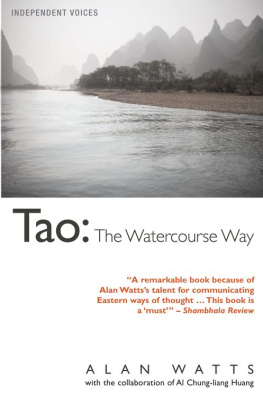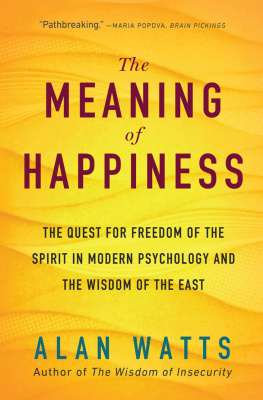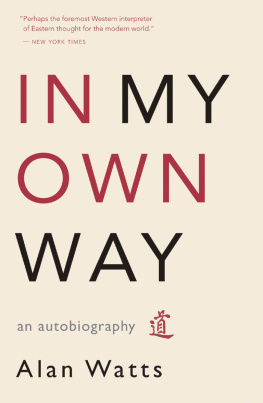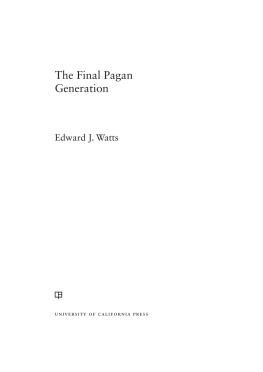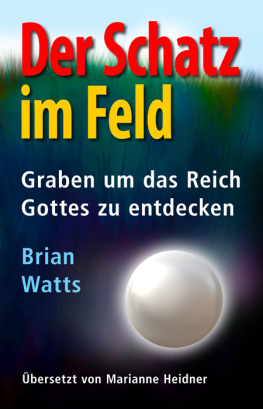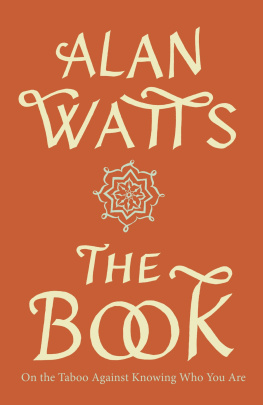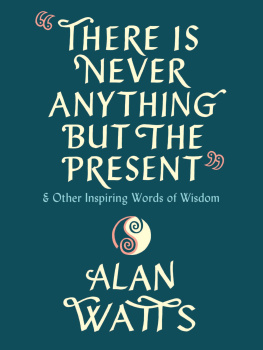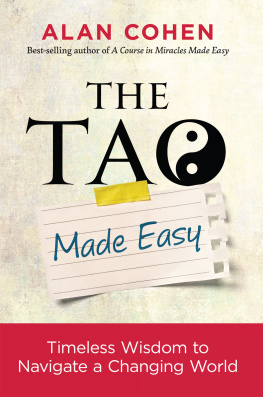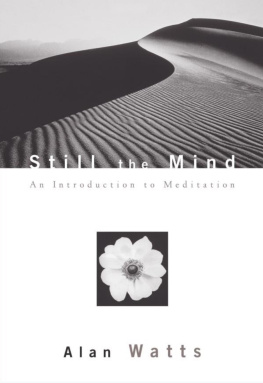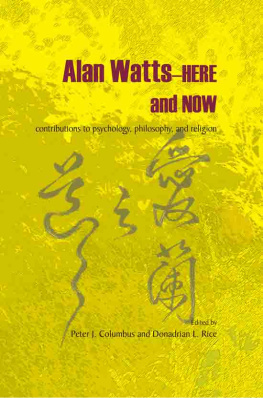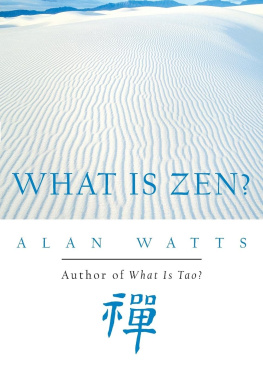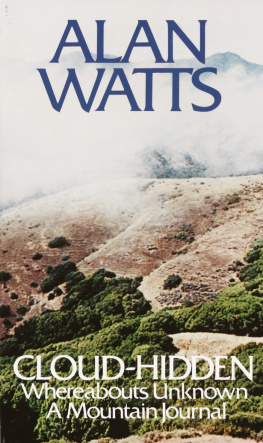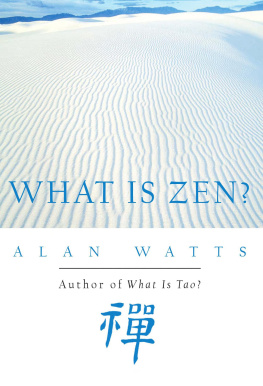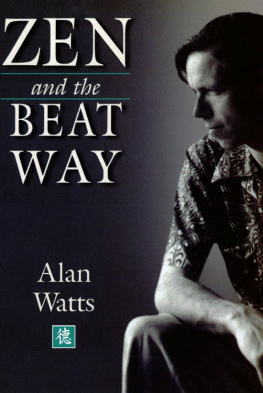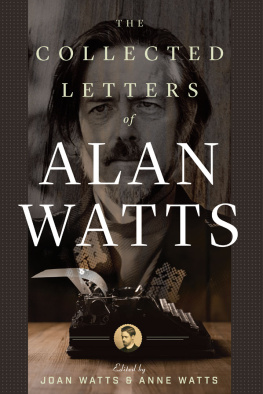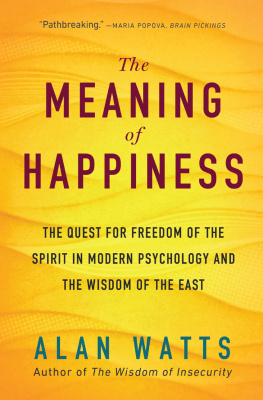Al Chung-liang Huang
T HE LAST MORNING I was with Alan Watts was spent in his mountain library overlooking Muir Woods, drinking tea, playing a bamboo flute, and plucking koto strings among the eucalyptus. We had just taught for a week together at Esalen Institute, Big Sur, and on the ferryboat of the Society for Comparative Philosophy in Sausalito. I was helping him with research on his book, and he had just finished reading the manuscript of my book, EmbraceTiger,ReturntoMountain. We were sitting on the library floor, comparing notes, nodding, smiling. Suddenly Alan jumped to his feet and joyously danced a taichi improvisation, shouting, Ah-ha, taichi is the Tao, wu-wei,tzu-jan, like water, like wind, sailing, surfing, dancing with your hands, your head, your spine, your hips, your knees with your brush, your voice Ha Ha ha Ha La La Lala ah ah Ah Gracefully he glided into the desk seat, rolled a sheet of paper into the typewriter, and began dancing with his fingers, still singing away. He was writing a foreword for my book, composing a beautiful introduction to the essence of taichi. It was probably one of his last actual writings before a strenuous European lecture tour took him away from his desk and from his new ways of spontaneous, joyous writing.
Alan was going to allow his book on Taoism to write itself. He knew, as a scholar, that he was turning out another of his famous themes-and-variations on the meeting of East and West. But as a man of Tao, he also realized that he must give up controlling it intellectually. For as the subject itself clearly maintains, The Tao that can be Tao-ed is not the Tao.
After so many years of writing beautifully the unwritable, Alan Watts was finally stepping aside, letting his writing happen . He turned to me for reflections. He wished to tune in body and mind totally with the movement of the Tao, in taichi. Alan was enjoying his newfound energy. He wrote the first five chapters with a great sense of discovery, lucidity, and creative insight. All of us who shared in the progress of this book felt confident that it would be his best, surely the most alive and useful. We could not wait for him to finish it.
From the beginning I had felt honored and happy to be of help to him. Alan was especially interested in the ways I read the original Chinese texts. We both found excitement in deciphering the difficult passages, loaded with ambiguity and multiple interpretative possibilities. We would look at all the existing translations, debate, digest, and dismiss them, and then start afresh, attempting a new, on-the-spot translation to satisfy us.
Alan helped me to feel at ease with my lack of fluency in the English language. He said to me often that my broken Chinese-English rendered the Chinese philosophy more explicitly , and that I must not try so hard to improve it. As a teaching team we complemented each other. We were an ideal combination to help people experience what they think they knowtaking them out of their heads into their bodies, then back again into their body-mind entity. Finally, Alan asked me to illustrate the book entirely with brush calligraphy. We agreed that the free-flowing brush strokes of the cursive (grass style) would most vividly bring out the watercourse way of the Tao.
After he had finished the chapter TeVirtuality, Alan said to me with a special glint in his eyes, I have now satisfied myself and my readers in scholarship and intellect. The rest of this book will be all fun and surprises! Alan had hoped to bring the Tao to his readers the way he practiced and experienced it in everyday living. Many new vistas had opened in Alans life. He was like a child again, willing and able to set forth upon new courses and follow the inevitable turning of energies.
During our last seminar at Esalen together, at the finish of an afternoon session when the high-flying spirit had set everyone smiling, dancing, and rolling up and down the grassy slopes, Alan and I started to walk back to the lodge, feeling exuberant, arms around each other, hands sliding along one anothers spine. Alan turned to me and started to speak, ready to impress me with his usual eloquence about our successful week together. I noticed a sudden breakthrough in his expression; a look of lightness and glow appeared all around him. Alan had discovered a different way to tell me of his feelings: Yah Ha Ho Ha! Ho La Cha Om Ha Deg deg te te Ta De De Ta Te Ta Ha Te Te Ha Hom Te Te Te We gibbered and danced all the way up the hill. Everyone around understood what we were saying. Alan knew too that he had nevernot in all his bookssaid it any better than that.
At the Alan Watts memorial celebration in the Palace of Fine Arts in San Francisco, someone in the audience shouted to Jano Watts: What was it like to live with Alan? Her answer: Never dull. He was a man full of fun and surprises. And the biggest surprise of all was on November sixteenth last year. During that last evening of his life Alan Watts played with balloons. He described the weightless, floating sensation as being like my spirit leaving my body. In the night he went on to a new journey of the spirit, riding the wind, laughing joyously.
He left behind, us, the living, missing him terribly for his bravura human aliveness. He left also empty pages, a proposed two more chapters of fun and surprises of the book he had begun on the Tao. Many of us with whom he discussed this work, or who met with him during the summer-long seminars on Taoism while TheWatercourseWay was happening, knew that in the final two chapters of the intended seven Alan hoped to let it be seen how the ancient, timeless Chinese wisdom was medicine for the ills of the West. Yet, paradoxically, it must not be taken as medicine, an intellectually swallowed pill, but allowed joyously to infuse our total being and so transform our individual lives and through them our society.
Elsa Gidlow, Alans longtime friend and neighbor, discussed this with me often. She confirmed our talks by writing the following:
It was his vision that modern technological man, in attempting absolute control over nature (from which he tended to see himself divided) and over all the uses of human society, was caught in a trap, himself becoming enslaved. Every control requires further control until the controller himself is enmeshed. Alan was fond of pointing to Lao-tzus counsel to the emperors: Govern a large country as you would cook a small fish: lightly. But it should be understood that Alan never saw the watercourse way in human affairs as a flabby, irresponsible, lackadaisical manner of living. The stream does not merely move downhill. The water, all moisture , transpires from the earth, streams, rivers, the ocean, to the upper air, a breathing out, and then there is the breathing in when the moisture is returned downward as dew, as raina marvelous cycle, a living interaction: nothing controlling anything, no boss, yet all happening as it should, tsejen.
Just how Alan would have communicated in his final chapters his insights into the need of the West for a realization and a living of the Way of the Tao, we can only guess. What we do know is that it transformed him as he allowed it to permeate his being, so that the reserved, somewhat uptight young Englishman, living overmuch in his head, in his mature years became an outgoing, spontaneously playful, joyous world sage. He believed that a widespread absorption of the profound wisdom of Taoism could similarly transform the West. This book was to be his contribution to the process.

